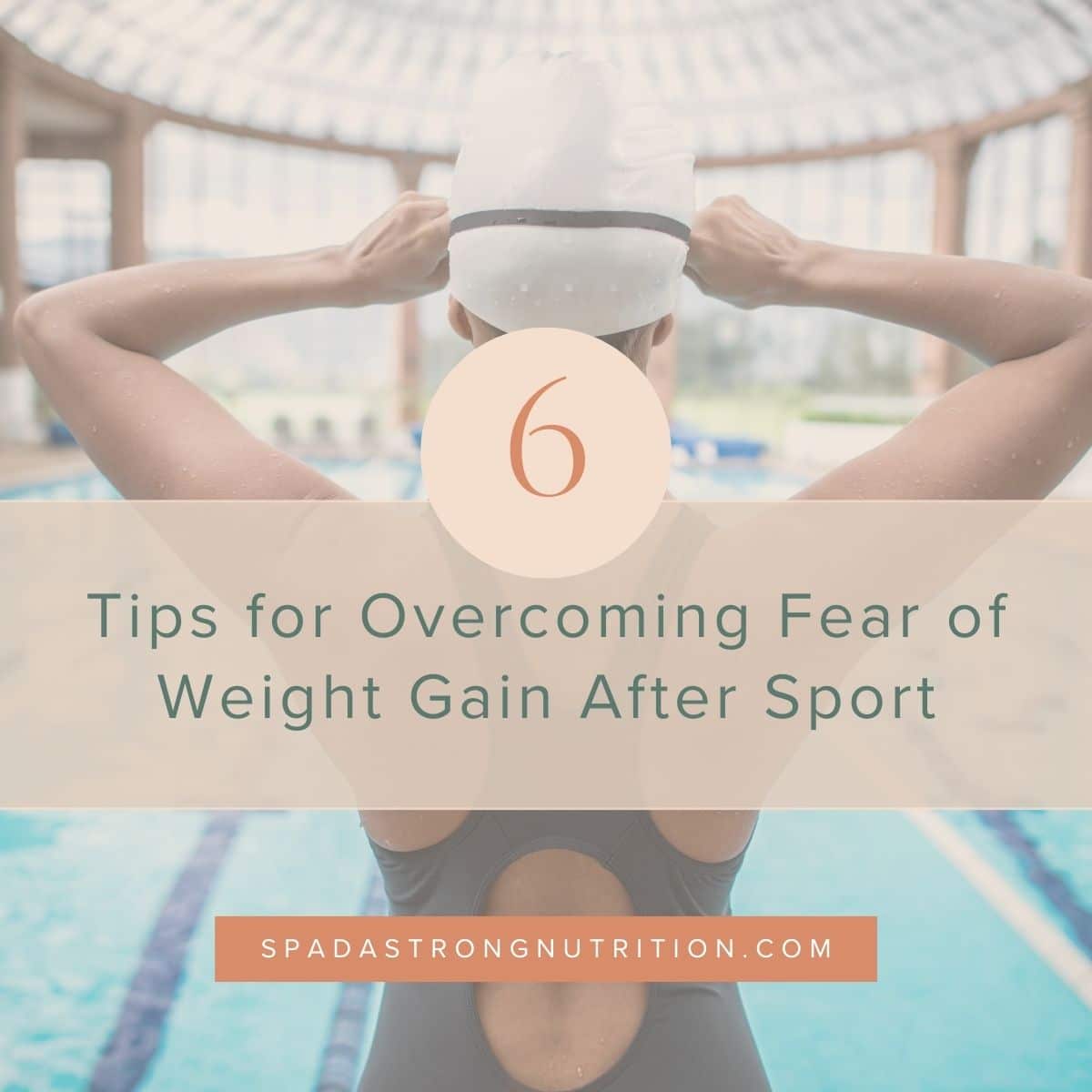Are you struggling with fear of weight gain after sport? If you’re a former athlete, like myself, it can be hard transitioning from years of training to “normal” life. You may feel like you need to keep up the hours of exercise that were required in college. Maybe you feel like you need to count calories or restrict what you eat so that you don’t continue gaining weight. And maybe all of this has led to obsession, overwhelm and frustration because you feel more uncomfortable in your body and more out of control with food.
If this sounds like you, you’re not alone. In this article, I want to share with you why obsessing and fearing weight gain does more harm than good and 6 of my tried and true tips to overcoming the fear of weight gain as a former athlete.
Why is fear of weight gain harmful?
Gaining weight is a normal part of being human. However, when you are a former athlete it’s easy to beat yourself up for it. You may think that you are letting yourself go or that if you just had more willpower around food and self-discipline when working out, you could lose the weight. But focusing on restriction and over exercising for weight loss can do more harm than good.
This can lead to under-eating, under nourishing and over exercising, which can impact digestion, hormones, energy, mood, period health, metabolism and your relationship with food and body.
Instead of stressing over weight gain and spending years obsessing and feeling out of control around food. I challenge you to try out these 6 tips to overcome this fear and live healthfully and happily as a former athlete.
6 Tips to overcome the fear of weight gain
Tip 1: Reflect on your past pursuits for weight loss
Really think about your past experiences trying to lose weight. Did you lose the weight? Did you keep it off? Did you gain it back? Did you gain back more than you lost? What was the experience really like?
Research shows that these efforts through restriction and over exercising actually lead to weight gain long-term. Meaning that you may lose the weight, but because your relationship with food suffers – you are likely to gain back the weight plus more.
If dieting causes you to be consumed with thoughts about food 24/7 and eating “fun” foods feels like all or nothing ending in you losing control with them, it’s likely that the diet isn’t working for you. And you’re not alone – 95% of diet efforts don’t last long-term.
Tip 2: Give yourself permission to be happy as a former athlete
You haven’t “let yourself go” if your body changes in retirement! Body changes are a normal part of being human. Especially as a former athlete going from the extremes of sport to life after.
If you find yourself struggling with body changes, know you’re not alone, your body is allowed to change. You haven’t let yourself go. Maybe you’re finally just letting yourself….live!
Think about in college when you were spending 8 hours a day training. Some people may miss that and there are definitely bittersweet parts of no longer getting to do that. But gaining weight because you’re not training for hours everyday isn’t one of them. Think about what else you’ve gained, maybe more time to spend with friends and family.

Tip 3: Get comfortable in your skin
Audit who you are following
Are you following a bunch of athletes who make you feel bad about yourself and where you’re at now? If so, unfollow or mute them and follow former athletes who are living their best life after sport and encouraging you to do the same.
Get rid of clothes that don’t fit
Do you have clothes from college that you’ve grown out of? Get rid of them. They no longer serve you and it’s completely normal to wear a bigger size than you did in college.
Have an affirmation bank
When thoughts about your body pop up, have affirmations to remind you that your body changing is normal and how much you still respect your body for all that it does for you.
Tip 4: Reframe WHY you’re working out
What if instead of doing the workout as punishment, or to “work off” all the food, “make up” for all the calories or doing it out of guilt and shame – you did it because you know your body FEELS better after you move it.
Movement can help with digestion, blood sugar management and mood. The action is still the same, you do the workout. But the intention is different and that makes all the difference. Pay attention to how you feel during the workout and then after, how it impacts other factors of your health like digestion, sleep, mood and energy.

Tip 5: Build confidence in nourishing your body
Just like exercise, there are benefits to nourishing your body adequately that don’t focus on what you LOOK like, but how you FEEL. Start paying attention to how you feel when you eat enough and consistently throughout the day. Do you have more energy? Do you feel more focused? Does it feel good to skip the hangry attacks and just be happy?
Tip 6: Set boundaries
People’s thoughts about your body are none of your business. However, if they make a comment directly to you, you are allowed to set boundaries. Here are some responses that may be helpful:
- “My body is not a topic of conversation”
- “I’m working on separating my worth from my appearance”
- “I appreciate your concern, however, your comments about my body make me uncomfortable”
Real Talk
It’s common to struggle with the fear of weight gain as a former athlete, but it doesn’t have to be your life. Focusing solely on your weight isn’t helpful, nor will it bring the happiness and confidence you are seeking.
Instead, challenge yourself to go against the grain and respect and care for your body after sport. This doesn’t mean you can’t enjoy working out or enjoy nourishing your body. It just means that you are focused on creating healthful habits that make you FEEL comfortable around food and confident in your skin.
When you retire from sport, no one gives you a playbook for how to transition your nutrition, deal with body changes or exercise without the structure of sport. Wouldn’t that be nice though? To have a guide in how to eat as a “normal” person and exercise regularly without just about killing yourself every time?
That’s exactly why I created the Fueled Former Athlete Academy. To help you transition your nutrition after sport, learn how to eat to support your body in a sustainable way, all while developing a healthy relationship with food, your body and exercise. Read more about it here!
